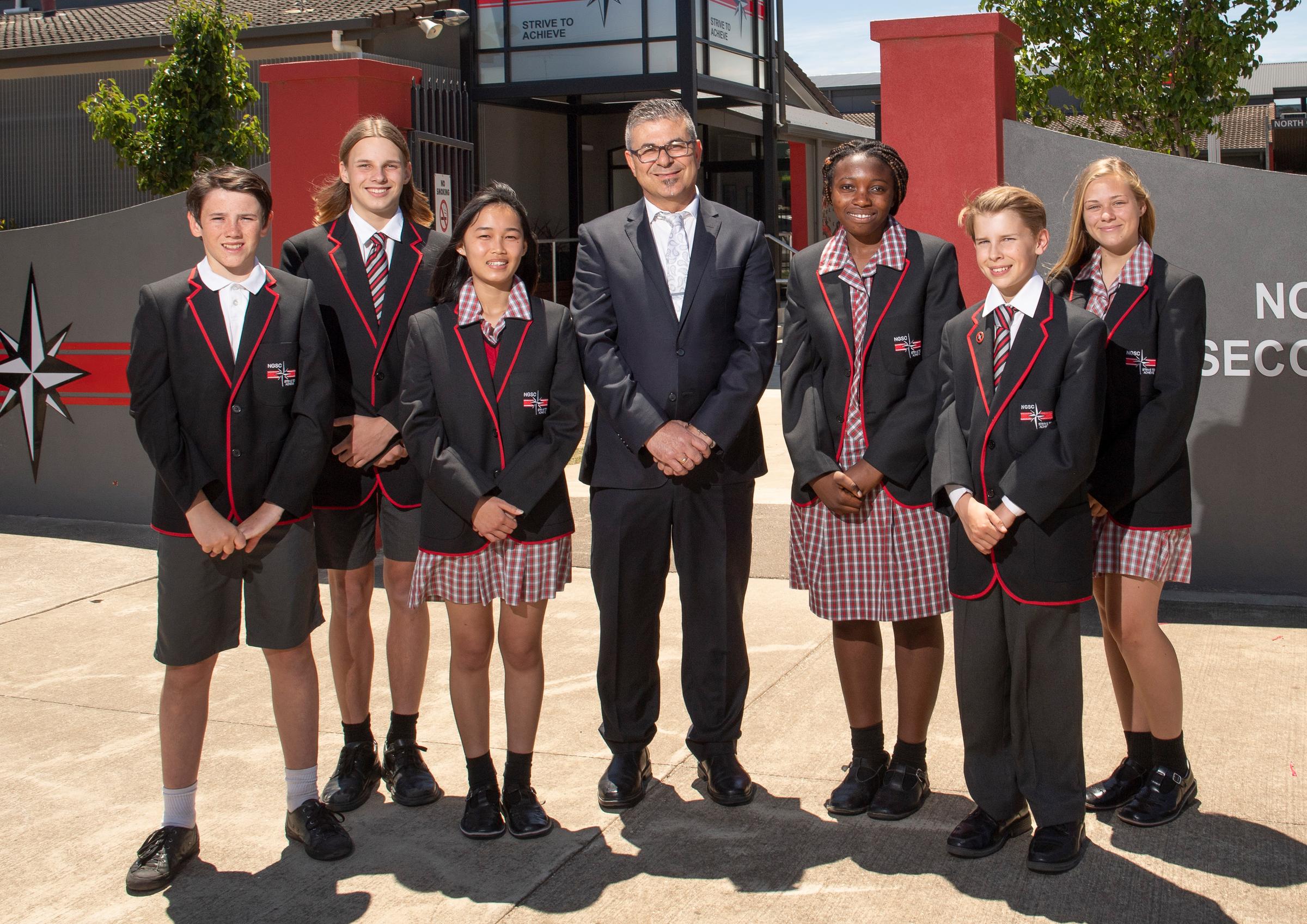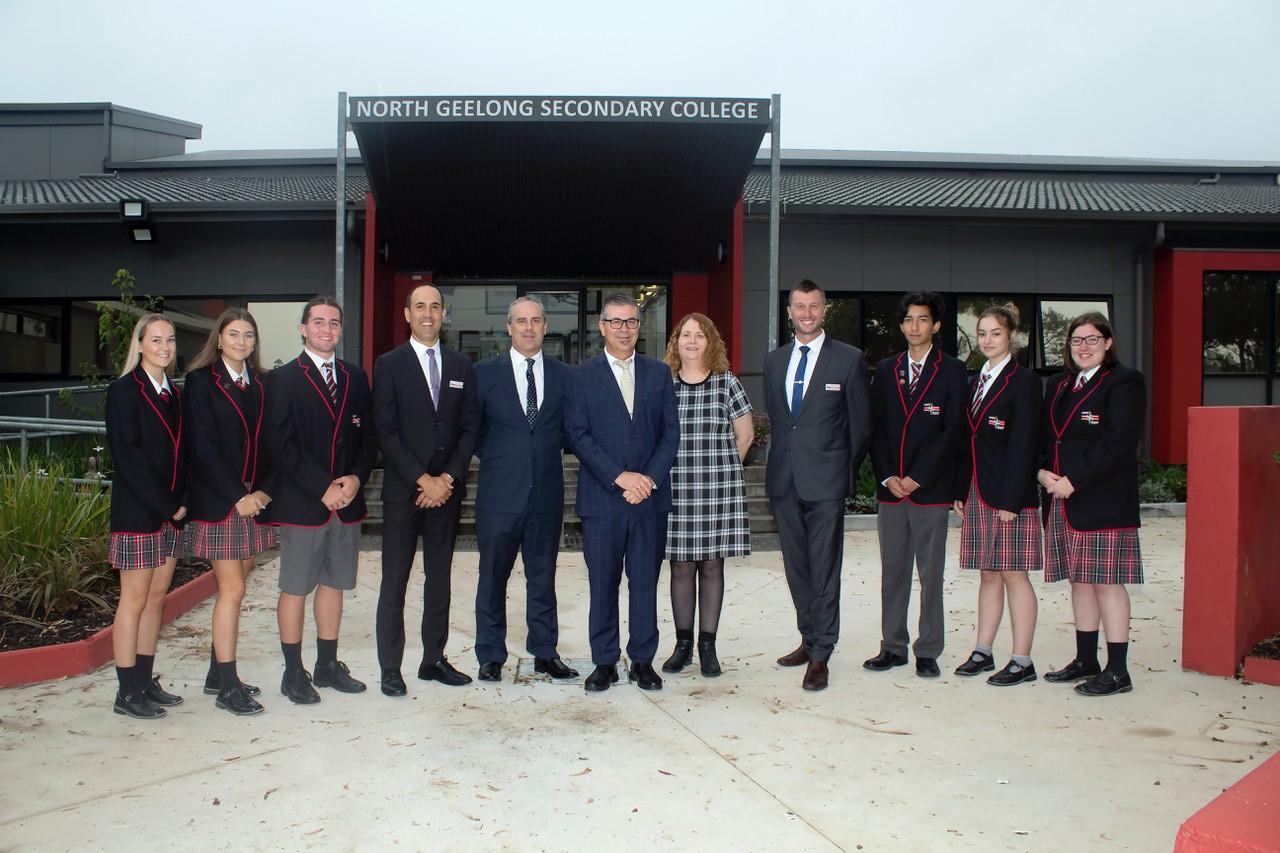
PRINCIPAL'S REPORT
Key Dates
25 FEB VCE Meet the Teachers Evening
26 FEB Student Photo Day
(In the event of absence a Make Up Photo Day will be scheduled)
28 FEB Whole School Assembly
9 MARCH Labour Day Public Holiday
12 MARCH Information Evening/Open Night
16-18 MARCH Year 7 Camp 1
18-20 MARCH Year 7 Camp 2
20 MARCH Whole School Assembly
24 MARCH Parent Teacher Conferences 7-12
26 MARCH Athletics Day - Landy Field
27 MARCH Last Day term 1
(1:30 PM Finish)
13 APRIL Easter Monday
14 APRIL Term 2 Commences
20 APRIL Year 7 Immunisations
Mr Nicholas Adamou
Principal
NGSC Leadership Team
Leadership is the art of motivating a group of people to act towards achieving common goals. In a school setting, this can mean leading teaching and learning and improved student outcomes ensuring that all students are working towards their full potential.
This leadership definition captures the essentials of being able and prepared to inspire students to achieve their personal best. At NGSC we believe in effective leadership, which is based upon the latest educational research and DET initiatives. The school leadership team (School Captains and Principals) is the team that inspires and leads the wider school community. The leadership team members possess the right combination of personal attributes and leadership skills to ensure the school community is travelling on a successful pathway.
2020 NGSC Leadership Team(School Captains and Principals) |
School Council
School councils play a key role in Victorian government schools. Effective councils have a wide range of skills, expertise and knowledge to support good governance and provide the best possible educational outcomes for students.
The annual school council election process provides an opportunity to attract members keen to add value and bring their expertise and skills to assist the governance of the school.
All government schools with students enrolled in Year 7 and above are now required to have a Student member category on council. The school election process for the Student member category must occur at the same time as Parent and DET employee member elections.
Where a council has Community member positions, council can co-opt members following the election process and add to the council’s skills and expertise.
School council membership
Each school council’s constituting Order makes provision for its structure and membership:
Parent members – parents of students at the school must comprise more than one third of the school council’s total membership. ‘Parent’ includes a guardian or person responsible for maintenance or with custody of a student of the school. Department employees are eligible for membership in this category as long as they have:
- children attending the school and the Department employees do not work at the school (except for the principal who is a member of the Department employee member category) of that school council.
- Department employee members – must not be more than one third of the school council’s total membership. The principal is automatically included in this membership category and has full voting rights. Other staff (teaching and non-teaching) are elected or co-opted to this category. To be eligible for election to this category, a person must be a member of the Department of Education and Training (DET) employee electorate of the school.
- Student members – ‘student’ describes a student who is enrolled at and attends the school and is in year 7 or above. Students are elected to this membership category, or co-opted if a casual vacancy occurs. To be eligible for election, a student must be a member of the student body of the school. The number of student members is recorded in the Ministerial Order for the school council.
- Community members – is an optional membership category. The council’s membership schedule may include this category. If a council has the option of community members, the council decides who to approach and co-opt into this position. People are co-opted by the school council to a community member position to bring additional skills and perspectives. Community members hold the same rights, responsibilities and terms of office as elected members. Parents are eligible to be co-opted to a community member position but Department employees are not. Students may also be co-opted to a community member position.
The North Geelong SC, school council composition includes:
(10 parents, 2 students and 5 DET employees including the Principal - Voting members)
- 10 x parents (no DE&T employees)
- 5 x DE&T employees – teaching and non-teaching staff
- 2 x students
Total number of voting members 17.
The College Principal is the Executive Officer of the school council
This year we have 4 parent vacancies for a 2 year appointment (2020 & 2021) and 1 DE&T employee member vacancy for a 2 year appointment (2020 & 2021). We also have 1 student vacancy for a 2 year appointment (2020 & 2021). I call for parent nominations for the 4 vacancies, any parent that would like to discuss the role of Council or the role of the parent member on council please call the school and speak to Mrs Narelle Wiffen or the Principal.
Nomination forms can be obtained from the General Office, see Mrs Narelle Wiffen and nominations close at 4:00 pm on Friday, 6 March.
I take this opportunity to thank all school council members in particular the parent body for their outstanding contribution to the life of the College.
Student Accident Insurance, Ambulance Cover Arrangements and Private Property Brought to Schools
Parents and Guardians are reminded that the Department does not provide personal accident insurance or ambulance cover for students.
Parents and guardians of students, who do not have student accident insurance/ambulance cover, are responsible for paying the cost of medical treatment for injured students, including the cost of ambulance attendance/transport and any other transport costs.
In some circumstances, medical or other expenses will be paid by the Department where it is assessed that it is likely, in all the circumstances, that the Department is liable for negligent (careless) acts or omissions of its staff/volunteers.
Student accident insurance/ambulance cover policies are available from some commercial insurers, and can be obtained by school councils on a whole-of-school basis, or by parents/guardians for individual students.
Private property brought to school by students, staff or visitors is not insured and the Department does not accept any responsibility for any loss or damage.
Homework
At the beginning of every academic year, a great deal is written in various publications on the topic of homework. Some of the education opinion-piece writers argue strongly that homework is an ineffective means of improving academic performance. Some go as far as to suggest that homework has a negative impact because it turns other children off school and causes tension between parents and their children. I agree with some of the criticisms of homework: excessive amounts of homework are counterproductive; it is not a case of more is better; homework without a clear purpose, e.g. ‘busy’ work, is of little value.
However, there is ample evidence from research and experience indicating that homework can increase learning and achievement. That is why it remains an important part and an expectation of the learning process for all North Geelong SC students. Please see school policy on “homework” on the school’s website.
There are many benefits that flow from completing regular, relevant homework. Homework helps students develop sound study skills and habits. By undertaking regular homework, students develop self-discipline and time-management skills, and begin to take responsibility for their own learning.
Homework supplements and reinforces work done in class. Revising work covered in class during the day greatly aids understanding and memory; the Ebbinghaus curve (The forgetting curve illustrates the decline of memory retention in time. A related concept is the strength of memory that refers to the durability that memory traces in the brain. The stronger the memory, the longer period of time that a person is able to recall it. A typical graph of the forgetting curve shows that humans tend to halve their memory of newly learned knowledge in a matter of days or weeks unless they consciously review the learned material) underlines the role that ‘re-visiting’ material plays in retention and recall of information. Homework of this type usually consists of written tasks, reading, drill work and memorisation.
Homework can also be used to extend students’ skills and understanding in areas that cannot be covered in limited class time. Extension activities usually take the form of longer projects which are an expansion of work covered in class, or problem-solving activities which may take several days or weeks to complete.
At NGSC, students always have homework irrespective of their Year Level. Students understand that homework is not simply the work set by their subject teacher; it is also work that the student needs to do to ensure that the day’s lessons are absorbed, previous work revised, preparation is made for new units of work and assignments are completed by the due date.
The role of the parent in homework is to support and help students. Students need to be provided with the environment and resources necessary to undertake homework and to establish a regular routine for school work done at home. However, parents must never forget that homework is set for the student, and that teachers need to see what students can do on their own. Parents should also be aware if their child is spending too long on homework tasks. Students should be encouraged to take regular breaks so they feel refreshed and ensure their study time is affective. Learning does not only take place in the classroom during scheduled lesson times. Homework plays an important part in learning also. Please call the school and talk to your child’s Home Group Teacher, Coordinator, Sub-School Leader or a Principal Class Officer, if there are any issues with your child’s homework.
Privacy Reminder to all Parents/Guardians
North Geelong SC collects, uses, discloses and stores student and parent personal information for standard school functions or where permitted by law, as stated in the Schools’ Privacy Policy
For more information about privacy, see: Schools’ Privacy Policy – information for parents. This information also available in nine community languages.
School Zone Speed Limits
With the new school year started, it is an opportune time for school communities to be reminded of the importance of road safety around schools.
School Speed Zones are enforced from the commencement of the school year and parents/carers are reminded to adhere to all VicRoads School Speed Zones rules.
Also parents/carers are reminded to take care and obey these parking signs and observe the Road Rules when picking up or dropping off students around schools. The City of Greater Geelong Parking and Information Officers monitor all supervised school crossings on a regular roster and issue infringements to drivers who stop in unsafe areas, such as “No Stopping” zones, within 20 metres of a school crossing, parallel to a yellow edge line, or if double parked, even for a moment to drop off or collect a student.
Queuing to enter a pick up/drop off zone can often lead to traffic congestion with vehicles being stationary in prohibited areas. Should the pickup/drop off zone be occupied with vehicles, to avoid the possibility of receiving an infringement, it is advised to drive around the block and return when legal parking is available.
Statistics show that illegal parking around schools is greatly reduced due to an Officer’s presence and Council prefers to achieve these results though education and awareness.
Designated school speed zones: Specified times (8:00 - 9:30 am and 2:30 - 4:00 pm).
Further information in regards to VicRoads speed limits around schools can be found at: VicRoads School Speed Zones
Also, please note that the school car park is out of bounds for all parents/carers. The car park is only for staff. It is imperative that parents DO NOT enter the car park during pick up/drop off as they are placing students and staff at grave risk.
I wish to thank all parents/carers who always adhere to all traffic rules re: school zones and also the school car park rules. The safety of all children, staff and parents is paramount.




